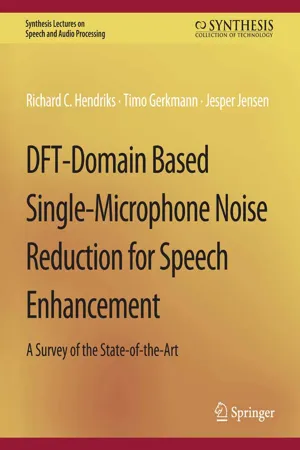
DFT-Domain Based Single-Microphone Noise Reduction for Speech Enhancement
- English
- PDF
- Available on iOS & Android
DFT-Domain Based Single-Microphone Noise Reduction for Speech Enhancement
About This Book
As speech processing devices like mobile phones, voice controlled devices, and hearing aids have increased in popularity, people expect them to work anywhere and at any time without user intervention. However, the presence of acoustical disturbances limits the use of these applications, degrades their performance, or causes the user difficulties in understanding the conversation or appreciating the device. A common way to reduce the effects of such disturbances is through the use of single-microphone noise reduction algorithms for speech enhancement. The field of single-microphone noise reduction for speech enhancement comprises a history of more than 30 years of research. In this survey, we wish to demonstrate the significant advances that have been made during the last decade in the field of discrete Fourier transform domain-based single-channel noise reduction for speech enhancement.Furthermore, our goal is to provide a concise description of a state-of-the-art speech enhancement system, and demonstrate the relative importance of the various building blocks of such a system. This allows the non-expert DSP practitioner to judge the relevance of each building block and to implement a close-to-optimal enhancement system for the particular application at hand. Table of Contents: Introduction / Single Channel Speech Enhancement: General Principles / DFT-Based Speech Enhancement Methods: Signal Model and Notation / Speech DFT Estimators / Speech Presence Probability Estimation / Noise PSD Estimation / Speech PSD Estimation / Performance Evaluation Methods / Simulation Experiments with Single-Channel Enhancement Systems / Future Directions
Frequently asked questions
Information
Table of contents
- Cover
- Copyright Page
- Title Page
- Contents
- Acknowledgments
- Glossary
- Introduction
- Single Channel Speech Enhancement–General Principles
- DFT-Based Speech Enhancement Methods–Signal Model and Notation
- Speech DFT Estimators
- Speech Presence Probability Estimation
- Noise PSD Estimation
- Speech PSD Estimation
- Performance Evaluation Methods
- Simulation Experiments with Single-Channel Enhancement Systems
- Future Directions
- Bibliography
- Authors' Biographies